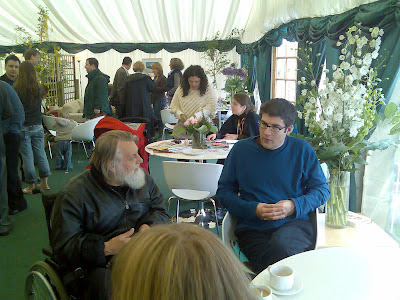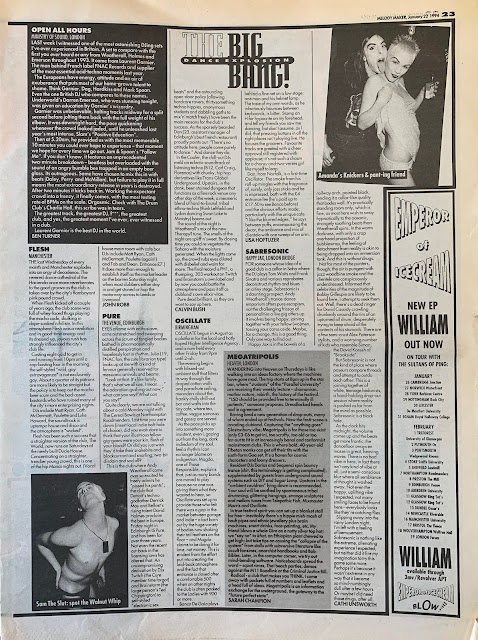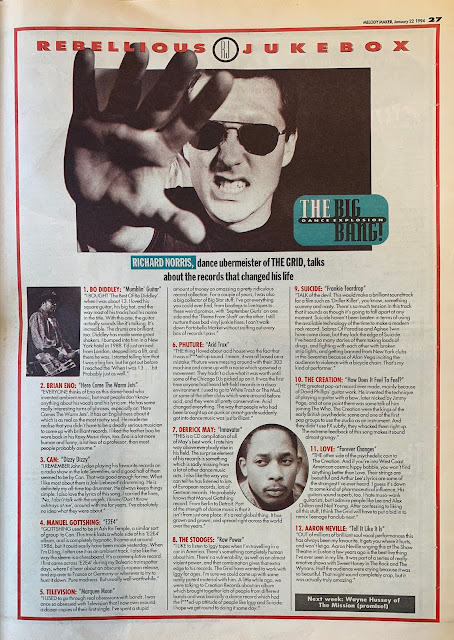PORTER RICKS
Think "house," and in your mind's ear you'll
probably hear a thudding, metronomic kick-drum and a shrieking soul-diva. Nearly
fifteen years on from its
I don't like purists either, but if the truth be known, when pop music's final reckoning is done, house is not going to be remembered for adding to the sum of "great songs," nor for its pantheon of distinctive vocalists. Its real contribution and innovation resides elsewhere.
In this
spirit, the
Take Chain Reaction's aesthetic pinnacle to date, "Resilient 1.2": a slow-motion tsunamai of ego-melting, body-boundary-haemorrhaging bliss. Some people call the Chain Reaction sound "heroin house" *; "Resilient 1.2" actually reminds me of Velvet Underground's "Heroin". A soundtrack in waiting for the first zero-gravity nightclub, it was my favourite track of 1997; you can find it on the Chain Reaction CD Decay Product, a compilation of tracks by the production team Various Artists.
Based out
of
Prise open the cannisters, and on tracks like Maurizio's "M6", Vainqueur's "Reduce 2" and Porter Ricks' "Port Gentil" you'll encounter electronic music as warmly cocooning and spongy as the lining of the womb.What initially sounds monotonous reveals itself as an endlessly inflected, fractal mosaic of glow-pulses and flicker-riffs. Using studio-processes like EQ, filtering, phasing and panning to tweak the frequencies and stereo-imaging of their sonic motifs, CR artists weave tantalising tapestries whose strands shift in and out of the aural spotlight. The effect is synaesthetic, like fingertips tremulously caressing your neck.
Although CR artists would probably distance themselves from rave's drug culture, their music sounds like Ecstasy sensations encoded in sound, abstracted into a velcro-sticky audio-fabric that tugs at your skin-surface and gets your goosebumps rippling in formation. Melody is minimal--limited to rudimentary vamps and ostinatos--because it's just a device for displaying sound-in-itself. Simple motifs twist the timbre-fabric in order to best show off its properties, making you thrill to the scintillating play of creases and folds, crinkles and kinks.
CR music
isn't all opiated oblivion: Monolake's "Lantau" and "
That said, this music's appeal extends way beyond ravers--anyone who's ever swooned to neo-psychelicists like Spacemen 3 and My Bloody Valentine, or been mesmerised by minimalists like Steve Reich, will find almost unbearable pleasures here.
As well as Chain Reaction's own CD and vinyl 12 inch output (available at domestic prices), addicts will want to search out the artists's releases on other labels: Porter Ricks' self-titled album on Mille Plateaux, Various Artists's glistening pulsescape "No.8" on Fatcat. Porter Ricks also created a fine remix album, The Koner Experiment, based on music by Experimental Audio Research--a collective that includes ex-Spacemen 3 leader Sonic Boom and MBV's Kevin Shields. That fact alone that should seduce any hesitant psych-guitar fiends into taking the plunge.






























